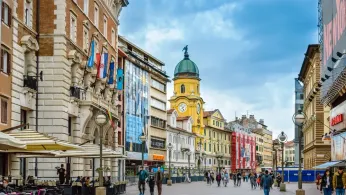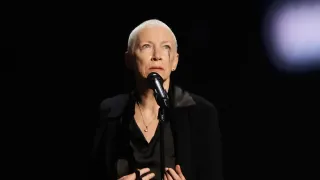
Oct 29
Rijeka Rising: Croatia’s Queer Coastal Secret
READ TIME: 3 MIN.
Tucked between the turquoise sweep of the Kvarner Bay and the forested foothills of the Dinaric Alps, Rijeka has long been Croatia’s “city with an open heart.” Once known primarily as a gritty port and industrial hub, Rijeka has reinvented itself as a center of creativity and progressive values, making it an increasingly welcoming haven for LGBTQ+ visitors seeking authenticity and community off the beaten path .
Rijeka’s transformation accelerated after it was named European Capital of Culture in 2020, a designation that fueled investment in the arts, nightlife, and public spaces. This cultural renaissance has gone hand-in-hand with a visible commitment to diversity and inclusion, drawing a new generation of queer artists, activists, and travelers .
Unlike Dubrovnik’s medieval spectacle or Split’s Roman grandeur, Rijeka’s appeal is more eclectic—an ever-evolving patchwork of Austro-Hungarian palaces, industrial relics, and bold contemporary murals. The city’s flagship cultural hub, the Rijeka City Museum, regularly hosts exhibitions highlighting queer history and the contributions of LGBTQ+ Croatians to the national story .
The annual “Moje, tvoje, naše” Festival, held each May, is a focal point for queer creativity—showcasing experimental theatre, performance art, film, and panel discussions on gender, identity, and intersectionality. The festival provides a safe space for transgender people, nonbinary individuals, and the broader LGBTQ+ community to share stories and celebrate difference .
Rijeka stands out for its grassroots activism and networks of solidarity. The city’s LGBTQ+ center, LORI , founded in 2000, has been a pioneer in advocating for queer rights in the region and remains a vital meeting point for locals and visitors alike . LORI organizes regular support groups, workshops, and film screenings, and its volunteers are eager to share insider tips on queer-friendly cafes, beaches, and nightlife.
While Croatia as a whole is still navigating its relationship with LGBTQ+ rights, Rijeka’s reputation for tolerance and openness is reflected in everyday life. Queer couples stroll hand-in-hand along the Korzo, Rijeka’s bustling pedestrian promenade, and rainbow flags fly openly during Pride celebrations .
Local drag queens are regular headliners at the city’s alternative venues, such as the legendary OKC Palach, a cultural center and club that hosts queer parties, live music, and art happenings throughout the year .
Beyond its urban appeal, Rijeka offers easy access to some of the Adriatic’s most secluded and queer-friendly beaches. The nearby village of Kostrena is famed for its rocky coves and relaxed atmosphere, and the island of Krk, just a short ferry ride away, is home to a handful of unofficial nude and gay beaches—perfect for travelers seeking sun, privacy, and a sense of freedom .
What sets Rijeka apart is its combination of low-key hospitality and unapologetic individuality. The city’s small but mighty queer nightlife scene is woven into the fabric of everyday life rather than relegated to a single district, and the absence of mass tourism means every encounter feels personal. Locals take pride in their city’s reputation for “being different”—and that difference is reflected in everything from the avant-garde music scene to the wild costumes of the annual Rijeka Carnival, where gender-bending and playful subversion are celebrated traditions .
Rijeka’s growing profile as a queer-friendly destination is no accident. The city’s leadership has publicly supported anti-discrimination policies and partnered with LGBTQ+ organizations to promote visibility and safety . In 2024, Rijeka hosted its largest-ever Pride parade, with participants from across the Balkans marching through the city center in a colorful display of solidarity and joy .
Queer travelers seeking meaningful connection, artistic inspiration, and Adriatic adventure are discovering Rijeka’s magic. As one local activist put it, “Rijeka isn’t just a place to visit—it’s a place to belong” .
Rijeka is accessible via direct flights from several European hubs or by a scenic train ride along the coast from Zagreb. English is widely spoken, and the city’s compact size makes it easy to explore on foot or by bike. For those wishing to connect with the local queer community, a stop at the LORI center or a visit to one of Rijeka’s queer-friendly cafes—such as Caffé Bar Skradin or the cozy Book Caffe Dnevni Boravak—is strongly recommended .
From the rainbow-painted steps of the Korzo to the shimmering blue of the Kvarner Bay, Rijeka invites queer travelers to write their own stories—welcomed, affirmed, and inspired by a city that proudly embraces diversity at its heart.






